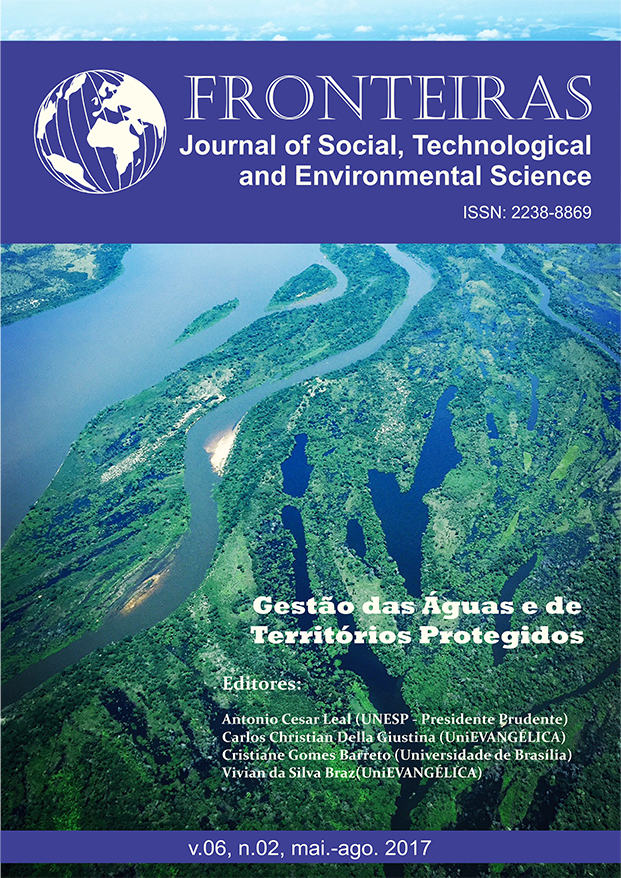O Arroz Africano na História do Novo Mundo
DOI:
https://doi.org/10.21664/2238-8869.2017v6i2.p182-197Resumo
O arroz foi introduzido em várias regiões das Américas durante o período colonial. As plantações de arroz floresceram no sudoeste dos Estados Unidos e no Brasil do século XVIII. Fortemente atribuído à iniciativa europeia, estudos recentes sugerem que os escravos africanos proporcionaram mais do que mão-de-obra para o surgimento do arroz como cultura alimentar no hemisfério ocidental. Isso decorre do consenso escolar de que o arroz foi domesticado independentemente na África Ocidental há 3.000 anos e um reconhecimento adicional do seu papel como provisão em navios de escravos transatlânticos. Este artigo resume os resultados da pesquisa em apoio à agência africana no cultivo de arroz do Novo Mundo. Uma abordagem histórica comparativa da cultura do arroz atlântico sugere antecedentes culturais africanos. A discussão examina o papel dos escravos africanos cultivadores de arroz na transferência da semente e habilidades de cultivo críticas para iniciar o estabelecimento da safra nas Américas.Referências
Carney J 2001. Black Rice: The African Origins of Rice Cultivation in the Americas. Harvard University Press, Cambridge, Mass.
Carney J 2004. ‘With Grains in Her Hair’: Rice History and Memory in Colonial Brazil. Slavery and Abolition 25(1):.
Carney J 2005. Rice and Memory in the Age of Enslavement: Atlantic Passages to Surinam. Slavery and Abolition 26(3):.
Carney JA, Rosomoff RN 2009. In the Shadow of Slavery: Africa’s Botanical Legacy in the Atlantic World. University of California Press, Berkeley.
Chevalier A 1937. Sur le riz africains du groupe Oryza glaberrima. Revue de botanique appliquée et d’agriculture tropicale 17(1):.
Chevalier A, Roehrich O 1914. Sur l’origine botanique des riz cultivés. Comptes rendus de l’Academie de Sciences.
Doar D 1936. Rice and Rice Planting in the South Carolina Low Country. Charleston Museum, Charleston.
Fields-Black E 2008. Deep Roots: Rice Farmers in West Africa and the African Diaspora. Indiana University Press, Bloomington.
Galeano E 1998. Faces and Masks: Memory of Fire. Vol. 2. trans. Cedric Belfrage. Norton, New York.
Hess K 1992. The Carolina Rice Kitchen: The African Connection. University of South Carolina Press, Columbia.
Heyward D 1937. Seed from Madagascar. University of North Carolina Press, Chapel Hill.
Littlefield DC 1981. Rice and Slaves. University of South Carolina Press, Baton Rouge.
Nunes Dias M 1970. Fomento e Mercantilismo: A Companhia Geral do Grão Pará e Maranhão (1755–1778). 2 Vols. Universidade Federal do Pará, Belém.
Pereira JA 2002. Cultura do arroz no Brasil. EMBRAPA, Teresina, Piauí.
Piso W 1957. História natural e médica da India occidental. Instituto Nacional do Livro, Rio de Janeiro.
Portères R 1970. Primary Cradles of Agriculture in the African Continent. In: JD Fage & RA Oliver (eds.) Papers in African Prehistory. Cambridge University Press, Cambridge.
Ribeiro O 1962. Aspectos e problemas da expansão portuguesa. Estudos de Ciencias Políticas e Sociais. Junta de Investigações do Ultramar, Lisboa.
Rochevicz RJ 1932. Documents sur le Genre Oryza. Revue de botanique appliquée et d’agriculture tropicale.
Rugendas JM 1954. Viagem Pitoresca através do Brasil. Livraria Martins Editôra, São Paulo.
Salley AS 1919. Introduction of Rice into South Carolina. In Bulletin of the Historical Commission of South Carolina. Columbia, South Carolina.
Schneider JT 1991. Dictionary of African Borrowings in Brazilian Portuguese. Helmut Buske Verlag, Hamburg.
Van Andel TR 2010. African rice (Oryza glaberrima Steud.): lost crop of the enslaved Africans discovered in Suriname. Economic Botany.
Van Andel TR, Meyer RS, Aflitos SA, Carney JA, Veltman MA, Copetti D, Flowers JM, Havinga RM, Maat H, Purugganan MD, Wing RA, Schranz ME 2016. Tracing ancestor rice of Suriname Maroons back to its African origin. Nature Plants 2(16149). doi:10.1038/nplants.2016.149.
Viguier P 1937. La riziculture indigène au Soudan français. In Annales agricoles de l’Afrique occidentale française et étrangère 1.
Wang M, Yu Y, Haberer G, Marri P, Fan C, Goicoechea JL, Zuccolo A, Song X, Kudrna D, Jetty SSA, Cossu RM, Maldonado C, Chen J, Lee S, Sisneros N, De Baynast K, Golser W, Wissotski M, Kim W, Sanchez P, Ndjiondjop MN, Sanni K, Long M, Carney J, Panaud O, Wicker T, Machado C, Chen M, Mayer KFX, Rounsley S, Wing RA 2014. The genome sequence of African rice (Oryza glaberrima) and evidence for independent domestication. Nature Genetics 46(9):.
Wood P 1974. Black Majority. Knopf, New York.
Downloads
Publicado
Como Citar
Edição
Seção
Licença
Esta revista oferece acesso livre imediato ao seu conteúdo, seguindo o princípio de que disponibilizar gratuitamente o conhecimento científico ao público proporciona maior democratização mundial do conhecimento.
A partir da publicação realizada na revista os autores possuem copyright e direitos de publicação de seus artigos sem restrições.
A Revista Fronteiras: Journal of Social, Technological and Environmental Science segue os preceitos legais da licença Creative Commons - Atribuição-NãoComercial 4.0 Internacional.


